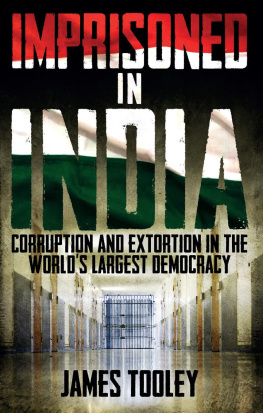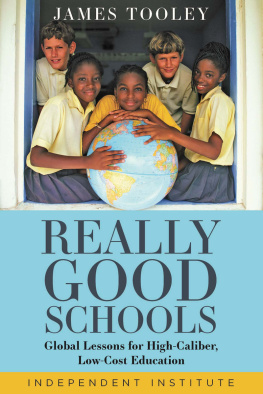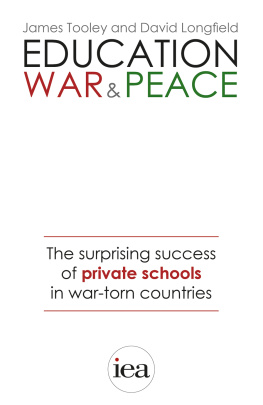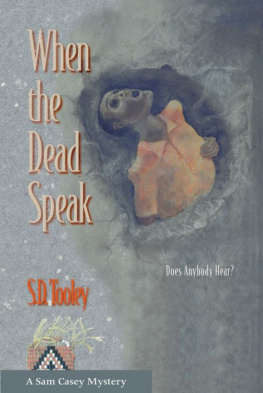ON 2 MARCH 2014 , I returned to Hyderabad, India my first visit for two years. In the interim, Id been working in some of the worlds most difficult places: South Sudan, Sierra Leone, Liberia and northern Nigeria, as well as Ghana. It was great to be back in India, where I knew I could rest in comfort and security.
In a review of my book, The Beautiful Tree, Id been described as a 21st-century Indiana Jones, who travelled to the remotest regions on Earth researching something many regard as mythical. I liked that image of myself: intrepid, adventurous. And the mythical thing I was tracking? Private schools serving the poor. I called it grassroots privatisation of education, by the people, for the people. These schools were everywhere in the slums and villages of Africa, South Asia and Latin America. But because they were an initiative of the poor, nothing to do with international agencies or governments, theyd remained entirely unnoticed. My research changed that. Now, many people wanted to talk about them.
Id first found these low-cost private schools in the slums of Hyderabad in 2000; I was back in this metropolis in south-central India because my friend Andrew Coulson of the Cato Institute was making a documentary for American television about educational entrepreneurship. He wanted to interview me where Id first discovered these low-cost private schools, for an episode about school choice among the poor.
Hyderabad had prospered a lot in the fourteen years Id been going there. India in general had grown wealthier; Hyderabad in particular had become a hub for high-tech industries. It boasted a new international airport and fancy highways. What had been slums where Id first found these schools had often become presentable lower-middle-class neighbourhoods.
Coming back to India after a two-year absence felt like a holiday. It was a respite from the kinds of places I normally travel to, a chance to be somewhere safe and welcoming. It was also a relief being among like-minded people: my work is controversial and politically charged it highlights how corruption and incompetence prevent governments from providing quality education for the poor. Government officials, not surprisingly, are often unsympathetic, and international aid organisations antagonistic. But this week in Hyderabad I could relax among old friends.
Andrew Coulson had booked me into a very swish hotel, the Park Hyatt in Banjara Hills, one of the most luxurious in Hyderabad. I normally stay in very simple places, but I can tolerate opulence if others are paying. I was joined by Sara and my niece, Alissa, who had been staying with Saras family in east India as part of her gap year between school and university.
Saras real name is Saraswati, after the goddess of knowledge, music and nature. She lets me shorten it to Sara. She has dark eyes, flowing dark hair, is beautiful, glamorous and vivacious. Somewhat surprisingly, to most people who see us together and especially to myself, shes my girlfriend. For the few years Ive known her, shes been living in India running her familys schools, while Ive been a professor in England. Long-distance relationships like this are hard to sustain. So it was particularly special for us to be together in Hyderabad, where we had first started seeing each other back in 2009 when I was more or less living there. Revisiting old haunts brought us close together. And in the evenings we had dinner and drinks with old friends, people such as Ayham from Lebanon, who bore the exciting news that he knew George Clooneys bride-to-be, Amal; Sara and Alissa were sure he could arrange an invitation for them to their wedding.
When everyone had gone to bed, Sara, Alissa and I stayed up talking and laughing into the night. We were surrounded by friends and family, in comfort, doing something meaningful to boot; it was, Sara and I agreed, our happiest time together.
We finished filming the documentary on Thursday 6 March. Alissa was leaving that evening for Thailand for the next leg of her gap year. Sara had booked a long weekend in Goa for us, flying early Friday morning. I seldom take holidays because I tend to feel guilty about having time off when there is so much work to be done, but I went along with it, for the sake of a peaceful existence. In any case, it was only a short break, I reassured myself, before I continued on to lecture in Delhi, then Dubai (sharing the platform with former president Bill Clinton), then on to Ghana and Sierra Leone to trouble-shoot in the schools I was running, before heading back to Newcastle University and then on to America. Business as usual. By the time Thursday arrived, however, I was feeling uncharacteristically relaxed and rather looking forward to our break.
Around 5 p.m. on Thursday evening, after wed bid goodbye to Alissa, I got a call from Mohammed, who runs schools in the Muslim Old City. Someone from CID the Criminal Investigation Department had been to visit, and he had told her where I was staying. She was on her way to see me.
Nothing to worry about, shes kind, he said. She just wants to clarify a few issues.
Which issues? I asked.
About the Educare Trust.
Really? I wondered why that had come up again.
Reluctantly, I went down to wait for her. Five-star hotels compete on how cold they can make it with their air conditioning, so I took my jacket with me, with my passport in one inside pocket, and notebook and pen in the other. People are often late in Hyderabad, so I also took my copy of Jad Adamss recent biography Gandhi: Naked Ambition to read while I waited.
I have a fascination with Gandhi. I like his ideas and the vigour with which he pursued them, but I dont like him as a person. He was too fastidious and prickly, unable to make even minor compromises to rub along with people. I was aware of the quip that it cost his friends a great deal of money to keep him in poverty and felt irritated by him being so sanctimonious. But a new book was out about him, and I had to read it.
The CID arrived at 7 p.m., a policewoman in charge accompanied by her male assistant. She showed me her identification card: Mrs [name], Deputy Superintendent, Criminal Investigation Department. We shall call her Mrs T. Mantra. She was in her mid-forties and wore a sari of a dirty green colour (the colour of algae, Sara said later). Her thin hair was tied into a ponytail and she was wearing a pair of old-fashioned, gold-rimmed spectacles. She wore a single gold bangle on each arm. Sara remarked later that Mrs Mantra had not been covering herself in a proper manner: the pallu of a sari should be pinned quite high on the shoulder, but she had it low, so it fell off her shoulder, exposing too much, as Sara put it. I cant say I noticed.
What I did notice, however, was her smile. Her huge smile was sweet and friendly.
Mantra treated her junior colleague in the way many official Indians treat their inferiors: with exasperation and impatience. I never got his name that night, nor during the whole period I knew him. He was tall and dark, with a very kind, wearied face; his life had made him sympathetic to the world. His shirt, a formal half-sleeve, was untucked over his formal black trousers. He carried a cotton bag the sort that villagers carry, a theli which held assorted items used throughout the evening.
We sat together in the elegant hotel lobby, on luxurious leather chairs so deep that we had to lean well forward to hear each other. A fashion show was being prepared in the banqueting rooms; glamorous models accompanied by older women chaperones walked briskly past, flirtily catching the eyes of men seated in the comfy chairs, or at least thats how it appeared to the men.
Mantra explained why she had come. The Educare Trust, which I had set up in 2002, may have received some foreign currency without the proper approvals under the FCRA, the Foreign Contribution (Regulation) Act. Yes, I knew this may have been a problem. Two years ago, when I had last been in Hyderabad, someone from CID had asked me to visit Police Headquarters where Id given a thorough statement. Id found a lawyer, Vashnu, on the recommendation of one of the junior managers at the Taj Banjara, a business hotel in a nearby part of town. His advice was that the problem, if indeed there was a problem, was not serious; it was nothing to do with me anyway, as I was not running the trust day-to-day. The solution was simple: we should close the trust down (its work in any case had ceased) and that would be the end of it. With my statement given and the trust closed, I had assumed I would hear no more of the matter.







